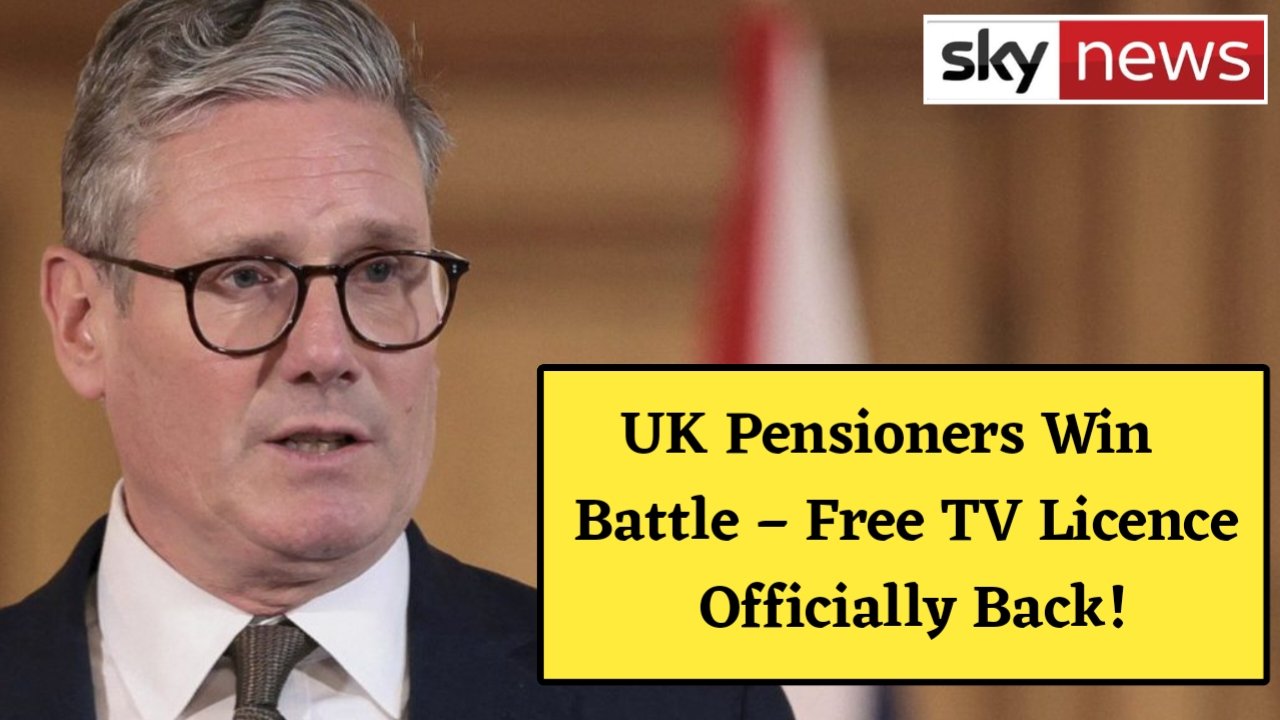For thousands of UK pensioners, this is a moment of relief and celebration. After years of campaigning, protests, and heated debates, the government has officially announced that the free TV licence for pensioners has been reinstated. This decision marks a significant victory for older citizens who had long argued that access to television is not just a luxury, but a necessity for staying connected, informed, and entertained. The announcement is expected to bring comfort and financial relief to millions of households across the United Kingdom, particularly at a time when the cost of living continues to rise and many pensioners struggle to manage their day-to-day expenses.
Why the TV Licence Issue Was So Controversial
The TV licence fee has been one of the most talked-about issues in the UK in recent years, especially since the BBC and the government decided to end the universal free licence for over-75s back in 2020. Under the previous rules, only pensioners receiving Pension Credit were entitled to a free licence, while others had to pay the annual £169.50 fee. This led to widespread anger and frustration among pensioners, who argued that after contributing to society all their lives through taxes and national insurance, they deserved the right to access public broadcasting without additional financial pressure.

The controversy was not just about money; it was also about dignity and recognition. For many elderly citizens, television is a vital source of companionship, especially for those who live alone. The removal of the free licence was seen by many as unfair and insensitive, particularly given the financial struggles faced by retired people on fixed incomes. The return of the free TV licence is therefore being hailed as both a financial and moral victory for pensioners.
What the Government’s Decision Means for Pensioners
The reinstatement of the free TV licence means that all pensioners above the qualifying age will once again be able to enjoy television without worrying about the annual fee. This move will directly benefit millions of households, saving them nearly £170 each year. For pensioners living on tight budgets, this saving is substantial—it could cover weekly groceries, energy bills, or essential medicines.
This decision is also likely to boost the morale of pensioners who felt ignored or sidelined in recent years. Many advocacy groups, charities, and politicians had repeatedly called for the government to reconsider its stance, pointing out the mental health benefits of television for elderly people who often face loneliness. By restoring the free licence, the government is acknowledging the importance of supporting older generations during a challenging economic period.
Wider Impact on Society and the BBC
The return of the free TV licence will also have a broader impact on society and the BBC. For the BBC, this means a reduction in licence fee revenue, which could affect future programming budgets. However, the public broadcaster has long faced criticism over its handling of the TV licence issue, with many accusing it of putting financial concerns over social responsibility. The latest decision could help rebuild trust between pensioners and the BBC, demonstrating that the broadcaster values its older audience.
From a societal perspective, the move signals a stronger commitment to supporting older citizens. It also sends a message that their voices matter and that their contributions to the nation are recognised. In a political climate where pensioners are one of the most active and engaged voting groups, this decision could also influence public opinion and future elections.
Reaction From Pensioners and Advocacy Groups
Unsurprisingly, the announcement has been met with joy and relief by pensioners across the UK. Advocacy organisations such as Age UK and various local pensioner groups have praised the government for listening to the concerns of older people and taking action. Many campaigners who had spent years fighting for this outcome have described it as a “hard-fought victory” and a testament to the power of collective action.
Social media has also been flooded with positive reactions, with pensioners and their families expressing gratitude for the decision. For many, this is more than just a financial win—it is about being treated with fairness and respect. The fact that their voices were heard and acted upon has given many older citizens renewed confidence in the democratic process.
What Happens Next
Now that the free TV licence has officially returned, the focus will shift to its implementation. Pensioners who are eligible will need to ensure that their licence records are updated, and further details are expected from both the government and the BBC in the coming weeks. Clear guidance will be essential to avoid confusion, particularly for elderly citizens who may struggle with online systems or complex paperwork.
At the same time, campaigners are urging the government to look beyond the TV licence issue and consider broader measures to support pensioners in the face of the ongoing cost-of-living crisis. Rising energy bills, food prices, and healthcare costs remain major concerns, and while the free TV licence is a positive step, it is only one part of a much larger challenge.
Final Thoughts
The reinstatement of the free TV licence is an emotional and practical victory for pensioners across the UK. It is a reminder that persistence pays off, and that the voices of older citizens cannot be ignored. For many, this is not just about television—it is about recognition, dignity, and fairness. While challenges remain, this decision is a positive sign that the government is willing to support pensioners in meaningful ways.
As the scheme rolls out, millions of pensioners will now be able to sit back, switch on their televisions, and enjoy their favourite programmes without the shadow of an annual fee. In times of financial uncertainty, that sense of comfort and relief is priceless.